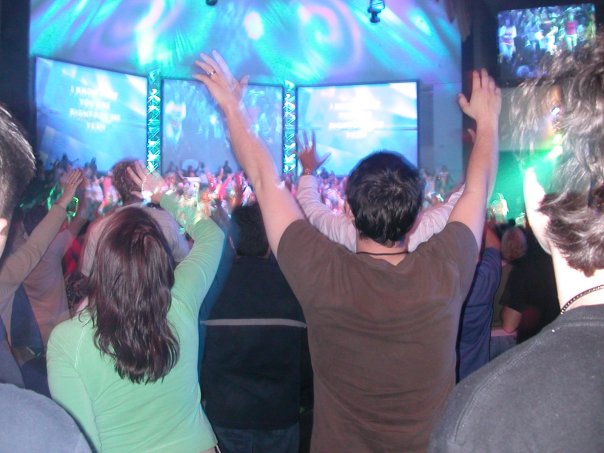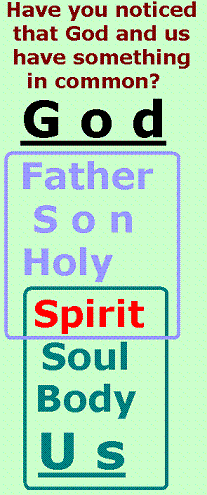
Basic Elements of Christianity
Worship
Rev. 19(7/26)
Unless otherwise noted, all Holy Scripture is KJV or AKJV.
Worship is an expression of our love to God.
I. The Nature of Worship
 Though the above definition is suitable for our purposes, it would be good to know that one of the main Hebrew words that is translated as "worship" means1 "to bow down, to bow down before God, to worship, to pay adoration, even without prostration." Praise is sometimes used interchangeably with worship. A main Hebrew word for praise means2 "to shine, to make shine; to give forth a clear and distinct sound. . . ." Giving thanks is also part of worship.
Though the above definition is suitable for our purposes, it would be good to know that one of the main Hebrew words that is translated as "worship" means1 "to bow down, to bow down before God, to worship, to pay adoration, even without prostration." Praise is sometimes used interchangeably with worship. A main Hebrew word for praise means2 "to shine, to make shine; to give forth a clear and distinct sound. . . ." Giving thanks is also part of worship.
In all,
it could be said worship is giving reverence to God by expressing our love and appreciation for Him. And it is not just for church. Each true Christian should worship God every day. There will be times when you might not feel like worshiping. However, God is worthy of our worship at all times, and many have found that as they fight against the desires of the flesh and soul but worship God anyhow, they receive, among other things strength and peace to help them through any difficult time they might be facing.
II. The Basis of Worship:
We should worship God for . . .
A. Who He Is: This is the highest form of praise because it recognizes the attributes of God which are constant. Though people and circumstances around us change, God's attributes never change. So we have reason to worship Him no matter what we are facing, and doing so strengthens our faith, love and trust of Him. Consider the following points.
1. Many great prayers of the Holy Bible begin with such worship: The Our Father (Matt. 6:9-10); Daniel interceding on behalf of the captive Jews (Dan. 9:4).
2. Such worship should precede, and continue through, spiritual battle. See 2 Chr. 20:18-22. The principles of this passage can certainly be applied to
spiritual warfare.
3. It should continue in the midst of trials troubles. See Isa. 37:14-16 and Dan. 6:10. Again, the principles of these passages can certainly be applied to
spiritual warfare. The other points about worship, viz. What He Has Done and What He Will Do, are also used in
spiritual warfare.
4. Some creatures before the throne of God offer continual worship — Rev. 4:6-8. When we personally proclaim the worship in this passage, we join in this heavenly chorus of powerful praise.
5. It is good to recognize the sovereignty of God in worship — Psalm 93. Doing so even when things do not turn out the way we would like them to will keep us faithful to Him, and will be a blessing to us.
Recognition of the sovereignty of God builds Christian maturity and strengthens our trust in Him.
We should also worship God for . . .
B. What He Has Done: Recalling what God has already done and worshiping Him for it reminds us that God will presently do a work according to His sovereign will. Some of the many things we can worship God for are as follows.
1. Salvation — Psa. 116:1-4: We should worship God with thanksgiving and praise for saving us. We can also thank Him that He is not willing anyone should perish in eternal damnation (2 Peter 3:9).
2. His Creation — Psa. 8, Psa. 136:1-6 Just remember to worship the Creator and not His creation!
3. Healing — Luke 17:15-19, Acts 3:1-9
4. His Grace and Deliverance Through Trials (troubles) — Judges 5:2-5, Mt. 14:22-33
5. Personal Spiritual Growth — Eph. 1:3, 2 Thess. 1:3
And, of course, the list can go on! We should also worship God for . . .
C. What He Will Do: By this, I certainly do not mean we decide how something will turn out and then worship Him for that expected end. But, instead, the following (non-exhaustive list):
1. As Proclaimed by the Word of God — There are many of these, including, but not limited to, the following: The return of Christ — Jas. 5:7-8, Jude 14-15; the peace that will blanket the world during Christ's millennial reign — Psa. 110, Isa. 11:6-9;Rev. 20:4; a completely new earth — 2 Pe. 3:13, Rev. 21:1-7.
2. As Directed by the Holy Spirit Based Upon the Word of God — And what we sense might happen needs to be based upon the Word of God. In Exo. 4:31, the Jews in Egypt worshiped upon hearing that God would then deliver them from that nation, in accordance with Joseph's Holy Spirit directed prophecy (Gen. 50:25) and the revelation from God given unto Abraham recorded in Gen. 15:13-14
3.
Here is an example from us. In the late 1980s we felt the call of God to start a church in Cambridge, MD. However, we were prevented by certain denominational authorities. We still felt in our hearts we were to go. God then confirmed this by three providential occurrences (You will learn about providential guidance later). On the third occurrence I worshiped God for what He was about to do. About two or three days later we learned a higher church authority decided a church body more local to Cambridge would make the decision whether we should go. We arrived in 1990, God providing finances and work for housing and establishing a church, which occurred in 1992. The Scriptural basis, of course, was Mt. 28:19-20 among many others.
Worship only belongs to God, Who subsists as Father, Son and Holy Spirit — Mt. 4:10, Rev. 22:8-9. By the way, remember this is one way to show the deity of Christ because every time we see Christ is worshiped, He accepts it. Contrast this with Acts 14:12-18 where Barnabas and Paul refused worship, and even had to restrain the people of Iconium.
We also should be careful to focus upon God and not to any music we may be hearing.
There are a variety of ways to express our love to God through worship, and it is never boring if you set your heart and mind to do it. Worshiping our Lord is always a wonderful, peaceful, strength and faith building experience. Here are just some of the ways to express our worship to God.
A. Praise: VOCALIZE your love for Him! Psa. 63:3 - Tell Him you love Him! - Psa. 116:1. Just under three weeks after committing to Christ, I went to a youth rally for the first time. Towards the end of the service I observed the worship and I remember one young man with blonde hair standing with his hands raised, tears rolling down his face, saying, "I love You Jesus!" I thought to myself, "That's the way it should be!"
B. Continuously Quote Worship Passages of Holy Scripture: Locate a passage in the Holy Bible that has praise to God, read it, then close your eyes and lovingly repeat the passage unto the Lord. I find certain passages easy to quote from memory since they have sort of a rhythm to them. You can also make up your own tune. Here are some passages:
Ps. 8:9 — O LORD our Lord, how excellent is thy name in all the earth!
Isa. 6:3b — "Holy, holy, holy, is the LORD of hosts: the whole earth is full of his glory.
Jude 25 — To the only wise God our Saviour, be glory and majesty, dominion and power, both now and ever. Amen.
Rev. 4:8d — Holy, holy, holy, Lord God Almighty, which was, and is, and is to come.
Rev. 5:13g — Blessing, and honour, and glory, and power, be unto him that sitteth upon the throne, and unto the Lamb for ever and ever.
As you see from the context of Revelation 4:8, worship sayings may be repetitive but, of course, we must mean what we are saying.
C. Sing: Do not worry if you sing off key.
If it is from your heart then it is beautiful in the eyes of God: Psa. 9:1-2. What if you do not know the Gospel hymns, songs, and choruses? Make an effort to learn them as you attend church or listen to Christian music. Especially learn the Holy Scriptures that are set to music, like Mt. 6:33, Psa. 103:1, Rev. 4:11 and others. You can also make up your own song, or put your own tune to Holy Scriptures of worship.

E. Lift Up Your Hands: 1 Tim. 2:8 - This act of love to God is seen throughout Holy Scripture from those who worship the true God. In my early years in Christ, I had a problem with being overly self-conscious and would not raise my hands. However, in one chapel service at Northeast Bible Institute the Holy Spirit was moving upon the congregation. I thought I should lift my hands but I wondered what others would think. Then, I felt God say to me that I should not care what others think and that He was worthy. So, I did it. There may have been some others God was dealing with who struggled, then did the same, because just after I raised my hands and worshiped, the Holy Spirit moved in a tremendous way upon the congregation of students.
F. With Musical Instruments: Psa. 43:4 and other passages show that a variety of musical instruments were used. There are some Christian or nominal Christian groups that do not have musical instruments. Most times it is because of one or both of two reasons. One thought is that musical instruments are too worldly and tend to promote and atmosphere of entertainment and not worship. However, we see that the Holy Scriptures instructs worshipers of God to use musical instruments. It remains for the Christians, though, to maintain a heart of worship instead of being entertained. One could be just as well entertained with a cappella.
Another view is that musical instruments are not mentioned in the New Testament for worship by disciples. However we can safely conclude that many times musical instruments were part of worship by first century Christians. First of all, the earliest disciples worshiped in the Temple where musical instruments were used in worship. Secondly, the Greek word “psallo”, translated as “making melody”, is used in Eph. 5:19. Psallo was used in the Septuagint (an ancient Greek translation of the Old Testament) to indicate musical instruments being played4.
G. Clapping: Ps. 47:1 and other Holy Scriptures speak of clapping in worship. This includes clapping according to the rhythm of a song as well as a spontaneous clapping directed by the Holy Spirit. However, it is sad to say in our time that congregations will clap after someone presents a special in song or even after a message or teaching, as if they were applauding the singer or preacher, instead of vocally praising God. Clapping in that manner encourages an attitude of entertainment and not of worship.
H. Dancing: Mentioned in 2 Sam. 6:14 and elsewhere, dancing should be directed by the Holy Spirit and focused on God. This, of course, is not the worldly type of dancing where one is physically involved with another person.
Here are some more ways to worship God and, to save time, I will give only one Holy Scripture for each.
I. Kneeling: 2 Chron. 6:13J. Bowing Down: Psa. 95:6
K. Standing Up: Neh. 9:5bL. Leaping /Jumping: Acts 3:1-8
M. Falling Prostrate: Dan. 8:17N. Serving The Lord: Rom. 12:1
Worship should be as follows.
A. In reverence Psa. 89:7 — As you can see from the context, to worship God with reverence does not mean we have to remain quiet, although there is a time and place for that. It does mean that we are to have a healthy, godly fear and respect along with a sense of how awesome God is. We should endeavor to do our best in worshiping.
B. In holiness - Psa. 93:5, 29:2 — There are times that you and I do not feel holy, but if we ask forgiveness, truly repent and walk in Him, He makes us holy. We, with God's help, must root out everything that is displeasing to Him.

C. John 4:24 — In Spirit and in Truth
1. Spirit — That is, the Holy Spirit, not just plain human emotion. Some Pentecostals may say this means you need to speak in tongues but I disagree, though I myself am Pentecostal. I will explain more in the lesson on the Holy Spirit.
2. Spirit — Our worship is to be directed by the Spirit Himself. Note that in Rev. 1:10-12 John was "in the Spirit." Verse 12 points out that He started to turn to see who was speaking to Him and note the middle part of 12, " . . . and being turned." The actual Greek shows that this turning went from active on John's part to that of passive on John's part. John started turning on his own, but then the Holy Spirit took over.
3. Spirit — Another aspect means our spirit. We are comprised of body, soul and spirit. True worship flows from us even when our own soul and / or body is not in the mood. God is a spirit, and so are we (see illustration to the right).
4. Truth — Some would have us think that we would need to belong to their particular religious group to meet this requirement, but let us keep in mind that Jesus said the He is the Truth (John 14:6), the Word is Truth (John 17:17 -19), and the Holy Spirit will guide us into ALL Truth (John 16:13, 1 John 2:27). You will do well to underline those passages in your Holy Bible.
5. Truth — If we are truly saved then we are in Christ the Truth (John 14:6) and Christ the Truth is in us — 1 John 3:24, 4:13. Read also John 15:1-17. Being in a particular denomination does not mean you are in the Truth. Actually being in Christ means you are in the Truth.
6. Truth — This would include a clear conscience in that we have nothing on our part that would bring displeasure to the Lord, and if there is something that would bring displeasure we should take care of it as directed by His Spirit. It would also include our motives. For example, we should not worship in order to "show off." Psa. 119:7
7. With Discernment — While there is the gift of discerning of spirits mentioned in 1 Cor. 12:10, each true Christian has a level of
discernment (1 Cor. 2:13-15). In aligning our will with His will, we will develop the mind of Christ (Rom. 12:1-2) from which we will be able to
"prove what is that good, and acceptable, and perfect, will of God." In so doing, you will consider that
true worship is to honor and glorify God.
While it is fine that Christian music has beat and rhythm to it, the beat and rhythm should never be the focus nor should we seek to gratify the flesh. If we clap, tap our foot, dance or whatever, we should come to the point in our Christian walk where it is the Holy Spirit directing our movements and not the beat, nor those around us.
Additionally, keep in mind that when we sing music, it is often poetry set to music. Sometimes poetical writings as such do not measure up to the Truth of God's Word. Some things we should not sing and some things we may sing keeping in mind that what we are singing might not line up with the word of God, or encourage us to assume things that should not be assumed. We Three Kings is not accurate in that the Holy Bible never said the Magi consisted of three men. This is assumed because three gifts are mentioned, however, it could have been five men bringing three types of gifts.
The children's song, "Father Abraham," assumes every child participating is a true Christian: "Father Abraham, had many sons. Many sons had father Abraham. I am one of them, and so are you, so let's just praise the Lord." Unless a teacher explains a few things the children singing that song have now placed in their minds that they are sons of Abraham, insinuating they are saved. This is too close to the error of
automatic universal salvation and puts an unsaved child in a state of mind thinking that they do not need to make a commitment to Christ. It could also encourage a child to think that they are saved because they go to church.
There are many more songs than these that do not match the Word of God, or imply something untrue about it. Always remember that the Holy Bible is the truth, not a Christian song.
D. The Sacrifice of Praise — Heb. 13:15, Psa. 50:13-15, 54:6, Jer. 33:11
1. There will be times that you will not feel like praising the Lord. Force yourself to do it. As you make yourself praise God, after some time you will feel His presence, and you will gain spiritual strength.
2.
There have been actual cases in our time of people who were suffering from a disease but committed to Christ as their Savior who, at some point, got immersed in worship and praise and they were healed!
3.
Psalm 22:3 points out that God inhabits (enthrones) the praise of Israel. I am sure that He inhabits our praises today. Wonder who inhabits our complaints and grumbling?
Let's take a quiz! English only.
--------------------------------------
Pictures of people worshiping are courtesy of Jennifer Macinta.
1 Wilson, William: "Wilson's Old Testament Word Studies" (MacDonald Publishing: McLean, VA;) p490
2 Wilson p322
3 Abraham, when he was named Abram, was called out by God from Ur of the Chaldees to Canaan. He was also directed by God to follow God, the one true God, despite the fact the people of that day worshiped many God. Because of his faith which produced the fruit of obedience, he was promised that his descendants would be without number (Gen. 15:5).
4 Vine, W. E.: An Expository Dictionary Of New Testament Words (The Old Time Gospel Hour: Lynchburg, VA) p730
Continue to the next lesson, Prayer
Lesson Menu
View the Glossary
Go to the Index
Abbreviations and about Reference Notations


 Though the above definition is suitable for our purposes, it would be good to know that one of the main Hebrew words that is translated as "worship" means1 "to bow down, to bow down before God, to worship, to pay adoration, even without prostration." Praise is sometimes used interchangeably with worship. A main Hebrew word for praise means2 "to shine, to make shine; to give forth a clear and distinct sound. . . ." Giving thanks is also part of worship.
Though the above definition is suitable for our purposes, it would be good to know that one of the main Hebrew words that is translated as "worship" means1 "to bow down, to bow down before God, to worship, to pay adoration, even without prostration." Praise is sometimes used interchangeably with worship. A main Hebrew word for praise means2 "to shine, to make shine; to give forth a clear and distinct sound. . . ." Giving thanks is also part of worship.
